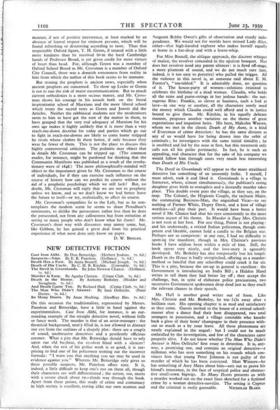NO CLOISTERED VIRTUE
Government and the Governed. By R. H. S. Grossman.
(Christophers. 75. 6d.)
IN his Introduction, the Warden of New College reminds readers of this book that it is no mere cloistered academic telling-over again the oft-told tale of the development of political theory, but the work of a don who has experience of practical politics, of a writer who cares less for what Gladstone or Marx said in 1876, than for what is relevant in anything they, or anyone else, have said to our present discontents. For Mr. Crossman, political philosophy is an art or reflections on the problems of an art ; it is not mere speculation, not in the least comparable to logical exercises ; no internal symmetry or subtlety can compensate for the lack of reality that dis- figures so much academic writing on political problems. If any one, therefore, comes to this book expecting a formal academic treatise of the familiar type, he will be, if not dis- appointed, at least surprised by what he reads. There is a
manner, if not of positive irreverence, at least marked by an absence of formal respect for eminent persons, which will be found refreshing or distressing according to taste. Thus that respectable Oxford figure, T. H. Green, if treated with a little more kindness than he received item the hard Cambridge hands of Professor Broad, is yet given credit for more virtues of heart than head. For, although Green was a member of Oxford School Board as Mr. Crossman is a member of Oxford City Council, there was a donnish remoteness from reality in him from which the author of this book seems to be immune.
But stoning the prophets is ancient news, especially when ancient prophets are concerned. To show up Locke or Green is not to run the risk of major excommunication. But to attack current orthodoxies is a more serious matter, and Mr. Cross- man shows his courage in his assault both on the literal inspirationist school of Maixians and the more liberal school which treats the sacred texts as Green and Jowett did the Articles. Neither the rabbinical students nor the modernisers seem to him to have got the root of the matter in them, to have grasped that the very real adequacy of Marxism for his own age makes it highly unlikely that it is more than a very reach-me-down doctrine for today and parties which go out to fight in reach-me-downs are likely to come home stripped by rivals whose clothes fit them better, if only because they wear far fewer of them. This is not the place to discuss this highly controversial criticism. The pedantic may object that in details Mr. Crossman can be tripped up. (The common reader, for instance, might be pardoned for thinking that the Communist Manifesto was published as a result 9f the revolu- tionary wave of 1848.) The more philosophically-minded will object to the importance given by Mr. Crossman to the course of individuals, for if they can exercise such influence on the course of history how can we predict its course without the aid of a prophetic psychology which we still lack? But, no doubt, Mr. Crossman will reply that we are not to prophesy unless we know, and as we don't know we had better leave the future to itself—or try, realistically, to affect its course.
Mr. Crossman's sympathies lie to the Left, but as he con- templates the modern scene he seems to share Proudhon's sentiments, to dislike the persecutors rather less than he does the persecuted, not from any callousness but from irritation at seeing so many people who don't know what hit them! Mr. Crossman's short way with dissenters may annoy some, but, like Gibbon, he has gained a great deal from his practical experience of what most dons only know on paper.
D. W. BROGAN.











































 Previous page
Previous page